Are you looking for Google alternatives? or Search engines that are just as good as Google?
In this article, I am going to discuss the best Google alternative search engines list of 2024, you can use to explore and to hunt down your queries.
While Google’s the big name everyone knows, it’s not the only option out there.
In fact, there’s a whole world of search engines waiting for you to try.
Why bother with other search engines?
Well, some might help keep your searches private. Others could be better for finding specific things like academic papers or images. And some just work differently, which might suit you better.
In this article, we’ll check out 50 great alternatives to Google you can use in 2024.
We’ll look at what makes each one special and how it might help you find what you’re looking for online.
Whether you’re worried about privacy, need to dig up some research, or just want to see what else is out there, we’ve got you covered.
Let’s explore these Google search alternatives and see what they can do!
- How Search Engines Work
- Why Do You Need A Google Alternative?
- Types of Best Search Engines
- 50 Best Google Alternatives: Top Search Engines List of 2024
- General-Purpose Search Engines
- Privacy-Focused Search Engines
- Regional Search Engines
- AI-Powered Search Engines
- Blockchain-Based Search Engines
- Academic and Research Search Engines
- Multimedia and Images Search Engine
- Archives and Creative Commons Search
- Social Media and Content Platforms
- User-Generated Content Based Search Engines
- Niche Content Search Engines
- Specialized Search Engines for Web Developers
- Metasearch Engines
- Google Search Alternatives for Greater Good
- Other Alternatives
- Conclusion
How Search Engines Work
Search engines are like digital librarians, helping us find what we need in the vast library of the internet.
Ever wonder how search engines find what you’re looking for? Let’s break it down:
- Web Crawling: Search engines use programs called “crawlers” that visit web pages. These crawlers follow links from one page to another as you might click through websites.
- Indexing: As the crawlers visit pages, they store information about what they find. This creates a huge index, like a digital library catalog.
- Ranking: When you type in a search, the engine looks through its index. It uses complex rules to decide which pages best match your search.
- Serving Results: Finally, the search engine shows you a list of web pages it thinks are most relevant to what you asked for.
Different search engines have their own ways of doing these steps. That’s why you might get different results depending on which one you use.
Why Do You Need A Google Alternative?
All of you might have heard that Google is the number one search engine. Well, yes this is absolutely true, the study shows that around 91.47% market uses the Google search engine.
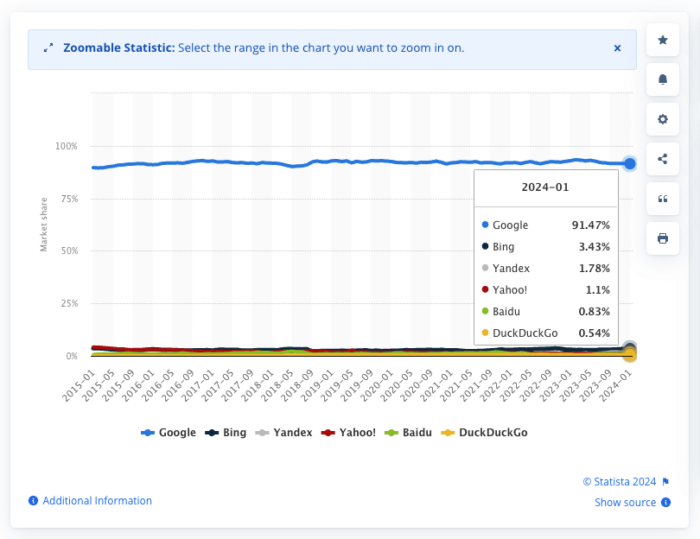
Google is a near-monopoly when it comes to online search.
This is because Google combinedly commanded more than 85% of online search volume over the last decade.
Other Google products like Google Images and YouTube come distant second and third respectively.
So it is evident that Google will be the top search engine for many more years to come.
Despite its popularity, ease of use, and giant market share, Google is not your only choice when it comes to online search.
The best reason why searchers prefer Google alternatives is the need to have more search privacy.
This is because Google tracks user data and uses it for its own ends and that of its third parties.
Have you noticed a lot of targeted ads on your Google search results? This can be annoying especially when it is overdone.
That is why, more and more people are looking for Google search engine alternatives that are less obtrusive, fast, and secure.
How Google Alternatives Can Be Helpful for Bloggers
Do you want more traffic to your website or blog to make it go viral? Then optimizing your blog for Google search engine alternatives can be an added advantage.
For bloggers and SEO analysts, this is always essential to keep track of the things around them. This is very important when Google leaves 13.65% off for other search engines.
In such situations, we need to find alternative search engines to Google, so that it can directly impact blogger and their work.
Here are the best Search Engine Optimization Tools you should check out to optimize your blog for Google alternative search engines.
Again let me tell you, besides Google, other search engines also offer millions of user queries to the user on a daily basis.
Thus, there are lots of search engines out there that can serve you both as a website owner (regarding generating traffic and revenue) or as a user.
There are many alternatives to Google, like Bing, DuckDuckGo, Yandex, Yahoo, etc. which majorly offer search results similar to Google.
However, some niche alternative search engines offer specific results. To simplify our discussion, I am going to categorize these best search engines and discuss them one by one.
Types of Best Search Engines
There are many categories of search engines in the market today.
It is sometimes difficult to categorize particular search engines into just one category. This is because one search engine can fit into several categories depending on what you are looking for.
In line with our foregoing discussion, we are going to give you the best Google alternatives in different categories.
These categories include but are not limited to the following;
- General Purpose Search Engines
- Privacy-Focused Search Engines – Secure Search
- Regional Search Engines
- AI-Powered Search Engines
- Blockchain-Based Search Engines
- Academic and Research Search Engines – Data and Stats Search
- Multimedia and Images Search Engine
- Archives and Creative Commons Search
- Social Media Search Platforms – Social Search
- User-Generated Content Based Search Engines – Forums
- Niche Content Search Engines
- Specialized Search Engines for Web Developers
- Metasearch Engines
- Google Search Alternatives for Good
- Other Alternatives
In practice, searchers are confronted with different search needs. The most common aspects that transcend every searcher experience are the following;
- What is the best search engine alternative to Google?
- Where can I get the most secure search experience?
- Which is the best Google alternative for privacy?
- What are the best Google alternatives for industry-specific information?
- Are there better search engine alternatives for social search?
Each type has its strengths. As we look at different Google alternatives, you’ll see how they fit into these categories and what makes each one special.
In the next sections, we’ll look at specific search tools in each category, helping you find the most popular search engine alternatives to Google search for your online searches.
50 Best Google Alternatives: Top Search Engines List of 2024
Let’s check out these Google alternatives and see what they bring to the table in 2024.
General-Purpose Search Engines
A general search engine is an internet resource or portal that uses common terms (or keywords, queries, etc) to extract data or information from the enormous database online.
The most popular Google alternatives in this category include Bing and Yahoo. Let’s look at some popular alternatives to Google that cover a wide range of topics:
1. Bing
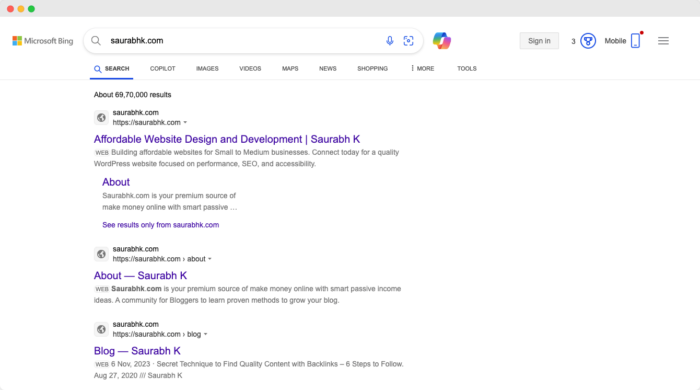
Microsoft’s Bing is the second-largest search engine globally. Bing holds about 3.43% of the global search market and is known for its clean look and great image search.
It is largely popular in the US — where its market share is 8.04%.
Key features of Bing
- Daily changing background images
- Visual search tools
- Microsoft Rewards program
Bing offers a more visually rich search experience and integrates well with Microsoft’s ecosystem.
It offers a fresh alternative to Google, especially for those who enjoy a more visually appealing search experience.
Its rewards program incentivizes users to choose Bing over other search engines.
Compared to Google, Bing has a smaller index and may provide less comprehensive results for some queries.
It sometimes falls short on non-English searches and might not have as many results as Google for some topics.
2. Yahoo!
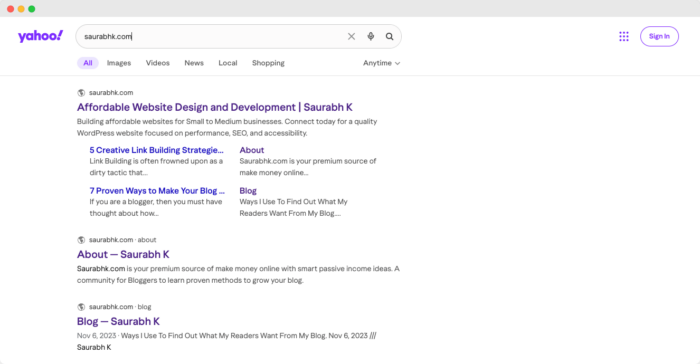
Yahoo! has transitioned from a standalone search engine to a web portal powered by Bing’s search technology. Yahoo! holds about 1.1% of the global search market share.
Yahoo! targets users who prefer an all-in-one platform for news, email, and search.
Key features of Yahoo!
- Integrated news and content
- Yahoo! Mail integration
- Shopping and finance sections
- Customizable homepage
Yahoo! combines search with other online services, making it a one-stop shop for many users.
Its familiar layout appeals to long-time internet users who like having everything in one place.
While Yahoo! offers a rich experience, it may feel busy to some. Since it uses Bing’s search results, you might not see much difference in search quality compared to Bing or Google.
If you enjoy having news, email, and search all together, Yahoo! might be the right choice for you.
3. AOL
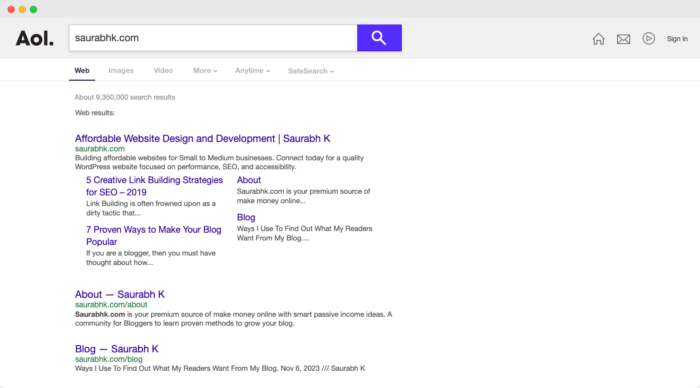
AOL Search, now owned by Verizon Media, uses Google’s search technology. It has a small market share but retains a loyal user base of long-time AOL subscribers.
Key features of AOL
- Access to AOL’s curated content
- Integration with AOL Mail
- Video search functionality
- Local search options
AOL Search feels familiar to older internet users who value familiarity and integrated services.
It offers Google’s search results along with AOL’s own content, giving you a blend of search power and curated information.
While AOL Search works well, it doesn’t offer much beyond what Google already provides.
If you want a taste of internet nostalgia with modern search capabilities, AOL Search could be worth a try.
4. Ask.com

Ask.com, once known as Ask Jeeves, holds a small portion of the search market. It offers a unique approach to online searches by answering questions directly.
Key features of Ask.com
- Question-and-answer format
- Smart Answers for quick information
- Poll-based results for opinions
- Image and news search options
Ask.com works well for people who like to phrase their searches as questions. It tries to give you a quick answer right on the results page, which can save time.
While Ask.com is user-friendly, it might not have as many results as bigger search engines. It’s best for simple questions rather than complex research.
If you often find yourself typing questions into search bars, Ask.com might be worth a try. It’s straightforward and aims to get you answers fast.
5. Excite
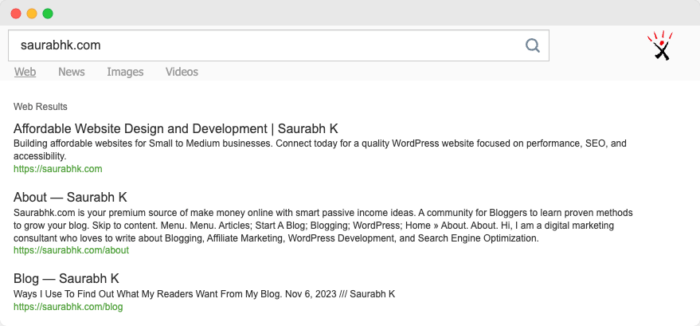
Excite is a web portal that includes a search function. It’s designed for users who like having various online services in one place.
Key features of Excite
- Personalized homepage
- News aggregation
- Email service
- Games and horoscopes
Excite offers a mix of search, news, and entertainment on one page. You can set up your homepage to show the information you care about most.
While Excite is handy for getting a quick overview of different online services, its search function isn’t as strong as some other options like Google and Bing.
It might work well for casual browsing but may not be the best choice for in-depth research.
6. Dogpile
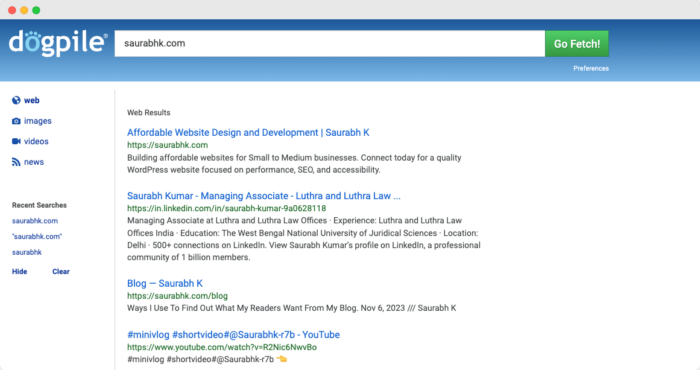
Dogpile is a metasearch engine that pulls results from several big search engines. It’s like having multiple search tools working for you at once.
Key features of Dogpile
- Combines results from top search engines
- Category-specific searches (images, videos, shopping)
- Customizable interface
- Fetches results from the deep web
Dogpile gives you a mix of results from different sources. This can be helpful if you want to see a wide range of information without checking multiple search engines yourself.
The downside? Sometimes you might see the same results more than once.
Also, Dogpile’s interface isn’t as sleek as some newer search engines and the combined results can sometimes feel overwhelming or redundant..
7. Entireweb
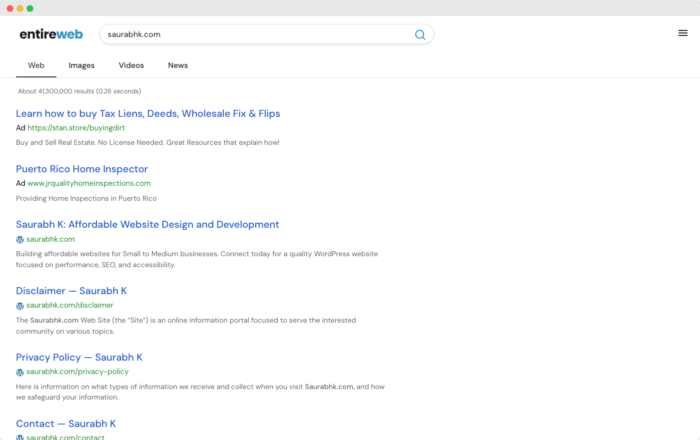
Entireweb is a search engine and online marketing platform that’s been helping businesses boost their online presence since 1999. It’s designed to give users relevant and reliable information while offering tools for businesses to reach wider audiences.
Key features of Entireweb
- Advanced search algorithm
- Comprehensive online marketing services
- Focus on high-quality, up-to-date results
- User-friendly interface
Entireweb uses a sophisticated search algorithm to deliver accurate results for a wide range of queries.
For businesses, Entireweb offers more than just search capabilities. It provides a suite of online marketing tools, including; SEO services, PPC advertising, Social media and Email marketing.
With over two decades of experience, Entireweb excels in delivering search results and marketing solutions. Based in Sweden, it offers an alternative to U.S.-based search engines and focuses on long-term strategies as a privately held company.
Though not as well-known as larger search engines, Entireweb provides quality results and comprehensive business tools.
8. Mojeek
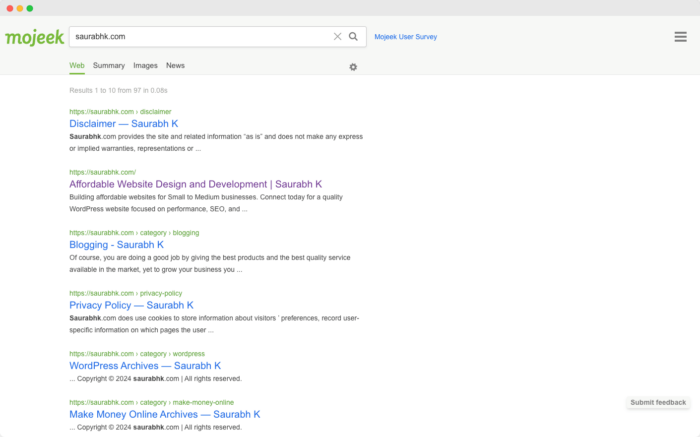
Mojeek is a UK-based search engine that crawls the web independently. It’s built for people who care about privacy and want unbiased search results.
Key features:
- No user tracking
- Independent web index
- Unbiased search results
- “Responsible” search approach
Mojeek stands out because it doesn’t rely on other search engines. It builds its own index of web pages, which means you might find things other search engines miss.
Mojeek’s index isn’t as big as Google’s or Bing’s. This means you might not get as many results for some searches, especially for very recent or local information.
If you want a search engine that respects your privacy and gives you a different view of the web, Mojeek is worth a try.
It’s a good choice for users who want to step away from the big tech companies.
9. Yep (by Ahrefs)
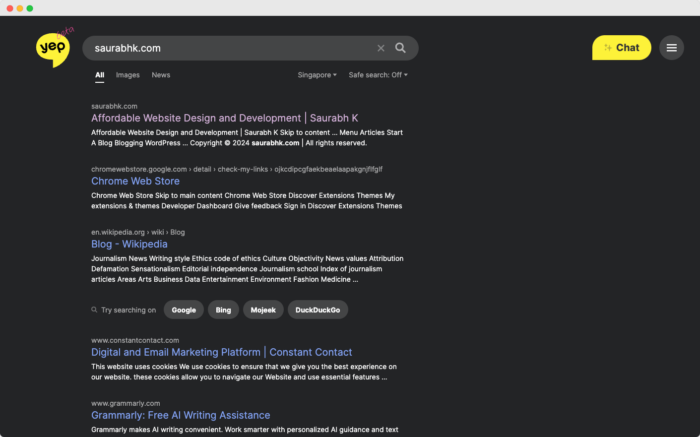
Yep is a newer search engine created by Ahrefs, a company known for SEO tools.
It aims to attract users interested in supporting content creators and those looking for a fresh approach to search.
Key features of Yep (by Ahrefs)
- Revenue sharing with content creators
- Clean, ad-free interface
- Privacy-focused approach
- Integration with Ahrefs’ web index
Yep stands out by paying websites when their content shows up in search results. This new model tries to reward good content creators.
Being new, Yep’s search capabilities might not yet match Google’s depth and breadth. Its payment model is still untested on a large scale.
If you want to support content creators while searching, Yep could be worth a try. It’s a fresh take on how search engines can work.
Privacy-Focused Search Engines
These search engines put your privacy first. They don’t track what you search for or save your personal info.
10. DuckDuckGo
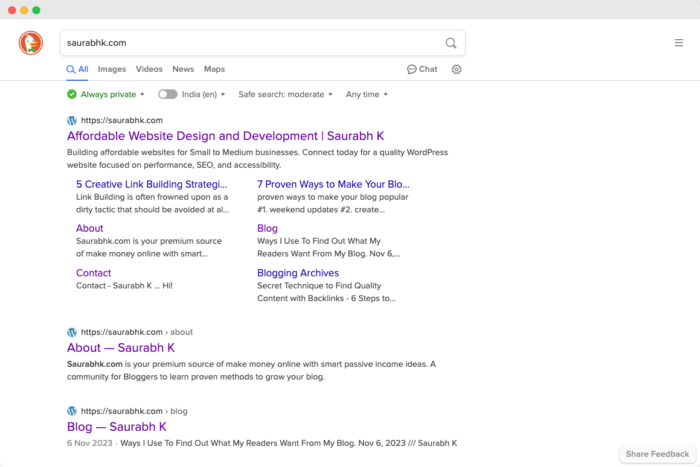
DuckDuckGo is the most privacy-focused search engine in the world with a market share of just 0.58%. It has become popular with people who care about keeping their online activities private.
Key features of DuckDuckGo
- No personal data collection
- Anonymous searches
- “Bang” shortcuts for quick site searches
DuckDuckGo doesn’t track you or create a profile based on your searches. This means you get the same results as everyone else for the same search.
You will not get results as tailored to your location or interests as you would with Google. But for many, the privacy trade-off is worth it.
If you want to search without worrying about your data being collected, DuckDuckGo is a great choice. It’s simple to use and puts your privacy first.
11. Startpage
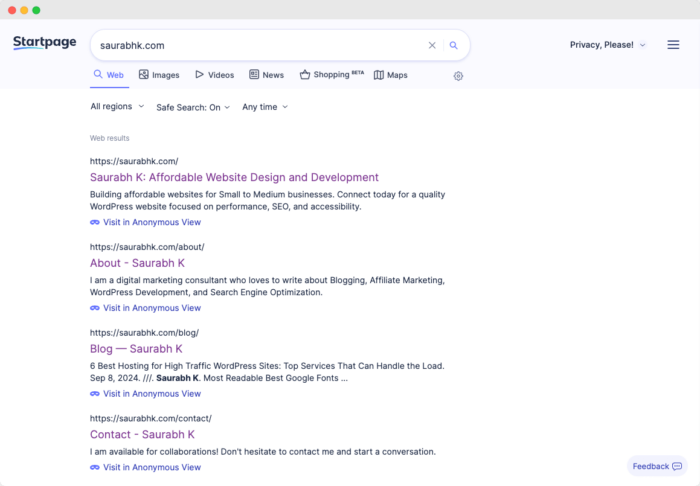
Startpage calls itself the world’s most private search engine. It uses Google’s search results but removes all identifying information from your queries.
Key features of Startpage
- Google search results without tracking
- Anonymous view for visiting websites
- No IP address or personal data storage
Startpage gives you Google-quality results with added privacy.
You get the best of both worlds – good search results and protection for your personal information.
You won’t get personalized results like you might with Google. But for many users, that’s a plus, not a minus.
If you want Google’s search power without giving up your privacy, Startpage could be just what you’re looking for. It’s a solid choice for privacy-conscious users.
12. Qwant
Qwant is a search engine from France that puts privacy first. It’s made for users who want to search without being tracked.
Key features of Qwant
- No personal data collection
- European data protection rules
- Qwant Maps for private navigation
- Qwant Junior for kids
Qwant gives you search results without watching what you do online.
Qwant might not give results as localized as Google. Also, its index isn’t as big, so you might not find as much for some topics.
If you want a search engine that respects your privacy and follows strict European data laws, Qwant is a good pick.
It’s popular with people who want to avoid big tech companies tracking their online activities.
13. SwissCows
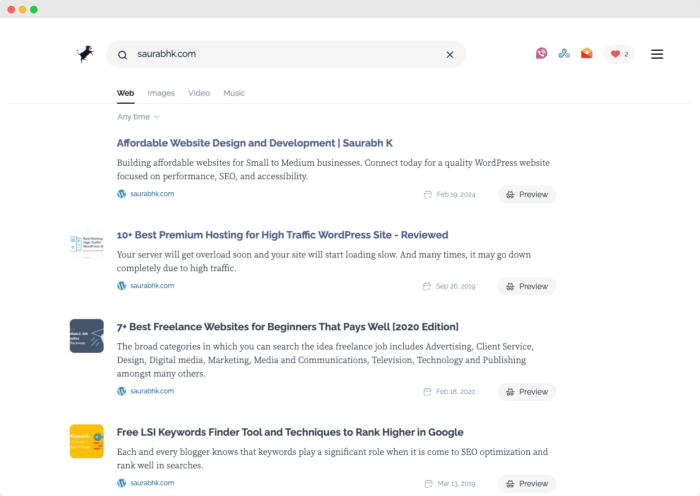
SwissCows is a family-friendly search engine based in Switzerland. It aims to give you a safe search experience without tracking you.
Key features of SwissCows
- No data collection or user profiling
- Family-friendly content filtering
- Semantic search technology
- Built-in translation tool
SwissCows uses smart technology to understand what you’re looking for, which can help you find good results quickly. It’s also great for families who want to keep searches kid-friendly.
SwissCows search index isn’t as extensive as Google’s.
It’s especially good for parents or teachers who want a safe search option for kids.
14. Search Encrypt
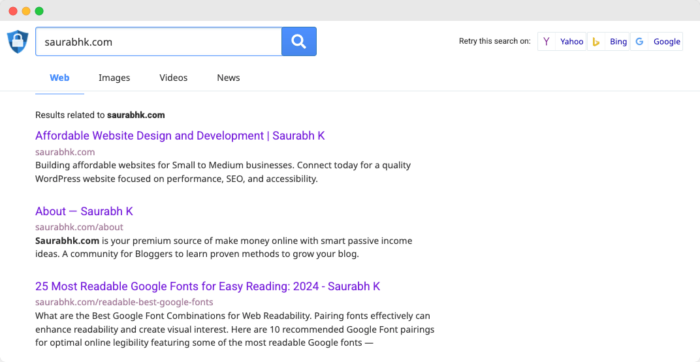
Search Encrypt is a privacy-focused search engine that uses local encryption to protect your searches.
Key features Search Encrypt
- Local encryption of search terms
- Automatic deletion of search history
- No IP address logging
Search Encrypt adds an extra layer of protection to your online searches. It encrypts your search terms on your device before sending them to the search engine.
One drawback is that Search Encrypt’s results might not be as comprehensive as those from larger search engines.
It’s a good choice for users who want their search history to stay private.
15. Gibiru
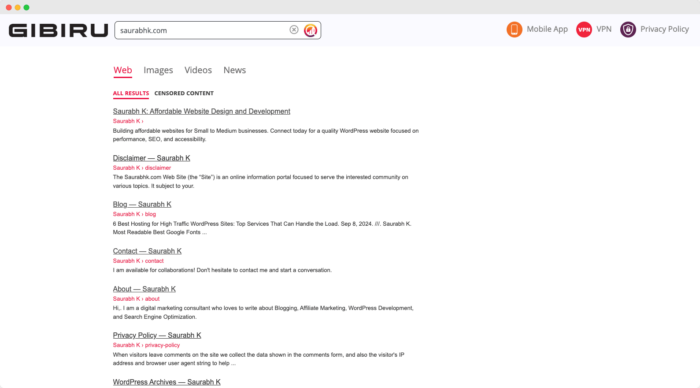
Gibiru markets itself as an “uncensored private search” option, appealing to users concerned about search result filtering.
Key features of Gibiru
- Anonymous search
- Shows unfiltered results
- Proxy service for private browsing
- No user data storage
Gibiru might show you results that other search engines leave out. This can be helpful if you’re looking for less common information.
One thing to keep in mind is that Gibiru’s interface is pretty basic.
It doesn’t have all the fancy features of bigger search engines. Also, the quality of results can be hit or miss.
16. Brave Search
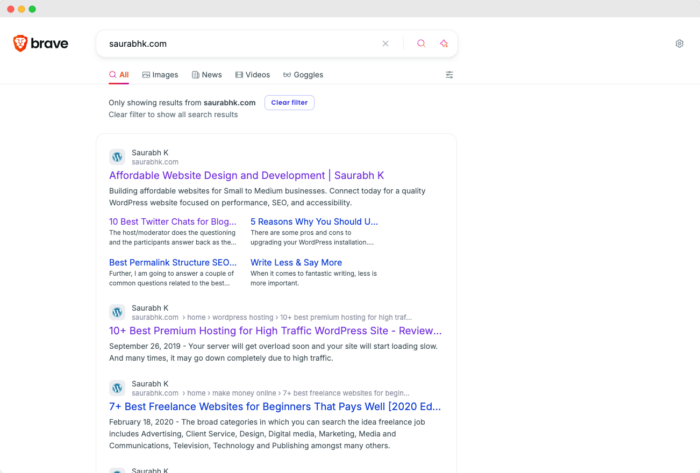
Brave Search comes from the team behind the Brave browser — one of the best privacy-focused web browsers.
It’s built for users who want privacy and independence from big tech companies.
Key features of Brave Search
- Independent search index
- No profiling or user tracking
- Clear ranking explanations
- Works well with the Brave browser
Brave Search offers a good balance of privacy and search quality, with its own index for many queries.
Brave Search is building its own list of web pages and still growing.
For some searches, it might use other search engines to fill in gaps. This could mean you get different results at different times.
It’s a good fit for people who already use the Brave browser or want to try something new.
These privacy-focused search engines show that you can look for information online without giving up your personal data. They’re good choices if you want to keep your searches private.
Regional Search Engines
Some search engines focus on specific regions or languages. Let’s look at a few:
17. Baidu (China’s Alternative to Google)
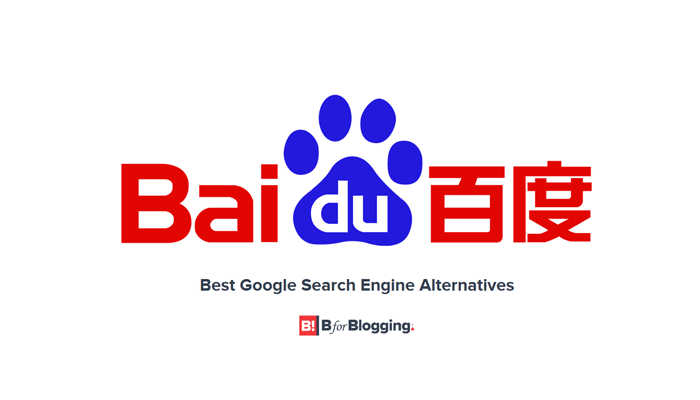
Baidu is the top search engine in China with a market share of 55.85%. It’s built for Chinese users and is the go-to search engine for millions of Chinese internet users.
Its worldwide market share is 0.83%.
Key features of Baidu
- Chinese language optimization
- Integrated services like maps and forums
- Mobile-first approach
- AI-powered search capabilities
Baidu works great for Chinese searches and local info. ts integrated services offer a comprehensive online experience for users in China.
It’s like having a Chinese-speaking guide to the internet.
It may not perform as well for non-Chinese queries or global information.
18. Yandex (Google Alternative in Russia)
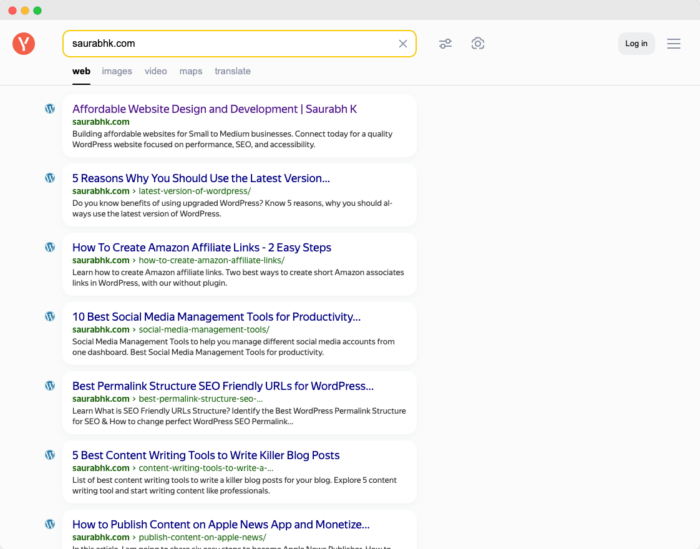
Yandex is the most popular search engine in Russia with a market share of 63.84%. It’s like Google for Russians. The worldwide market share of Yandex is 1.78%.
It’s specifically built and dominates the Russian search market and serves several Eastern European countries.
Key features of Yandex
- Strong local results for Russian-speaking areas
- Advanced image and video search
- Built-in email and cloud storage
- Machine learning-based search algorithms
Yandex offers high-quality results for Russian language searches and local information. Its technology is competitive with global search engines like Google and Bing.
If you’re in Russia or need Russian info, Yandex is a top pick. It’s the go-to for millions of Russian-speaking internet users.
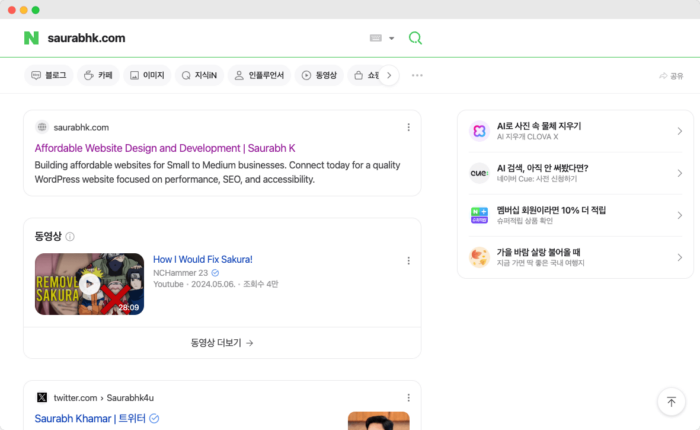
Naver is South Korea’s go-to search engine, offering a unique blend of features tailored to Korean users.
- Knowledge iN (Q&A platform)
- Green Window (curated content)
- Real-time trending topics
- Integrated services (email, news, shopping)
Naver’s layout might surprise you if you’re used to other search engines. It packs a lot of information on one page, giving users a quick overview of various content types.
When using Naver, remember it’s heavily focused on Korean content. If you’re looking for info in other languages, you might need to dig a little deeper.
For businesses targeting the Korean market, Naver is a must.
Its popularity in South Korea makes it essential for reaching local customers and understanding Korean online trends.
20. Seznam (Czech Republic’s Google Alternative)
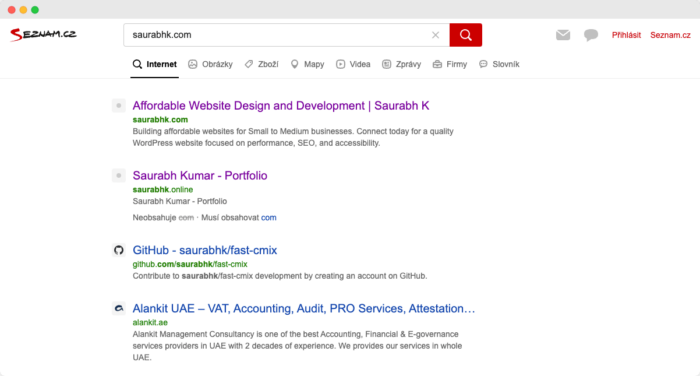
Seznam is the Czech Republic’s homegrown search engine, holding its own against global competitors.
Key features of Seznam
- Local content focus
- Integrated services (email, maps, news)
- Two user agents for crawling and screenshots
- Mobile-friendly design
Seznam understands Czech internet users like no other. It offers a familiar interface while prioritizing local content and services.
Seznam’s crawlers work a bit differently from other search engines.
They use separate user agents for crawling pages and taking screenshots, which can affect how your site appears in results.
If you’re doing business in the Czech Republic or want to reach Czech internet users, Seznam shouldn’t be overlooked. It’s a key player in the local digital landscape.
21. Coc Coc (Vietnam‘s Google Alternative)
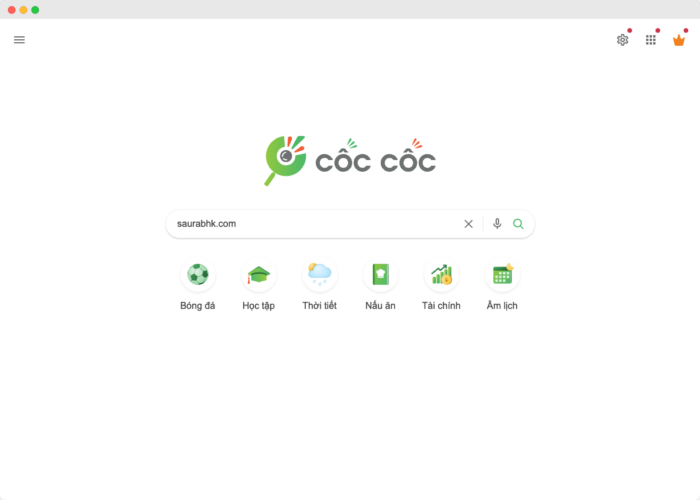
Coc Coc is a web browser and search engine combo tailored for Vietnamese users.
Key features of Coc Coc
- Built-in ad blocker
- Fast download capabilities
- Picture-in-Picture mode
- AI chat assistant
Coc Coc aims to be more than just a search engine. It’s a full-fledged browser with features designed to enhance the Vietnamese web experience.
One thing to note is that Coc Coc focuses heavily on the Vietnamese market. While it offers general web search, its standout features are geared towards local users.
Its popularity in Vietnam makes it a valuable tool for understanding local internet habits and preferences.
These regional search engines show how local needs and preferences shape search technology around the world. They offer strong alternatives to global engines in their specific markets.
AI-Powered Search Engines
These search engines use artificial intelligence to improve search results and user experience.
22. You.com
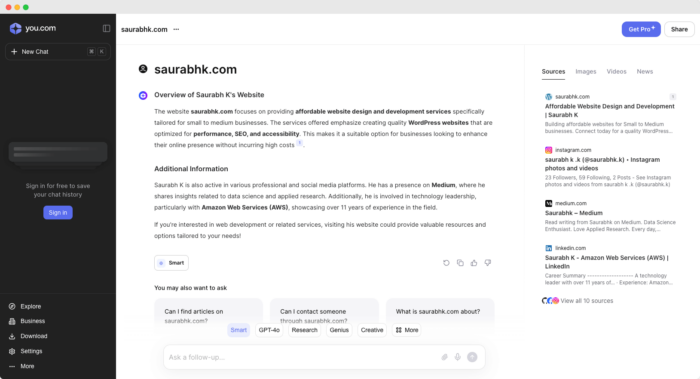
You.com started as a search engine but has grown into a full-fledged AI assistant.
Key features You.com
- Personalized search results
- Voice and image search capabilities
- Multiple AI models (GPT-4, Google Gemini, Claude)
- Privacy-focused approach
You.com stands out by offering a wide range of AI models to choose from. This gives users flexibility in how they interact with the AI.
When using You.com, you’ll notice it’s more than just a search engine. It’s designed to be an all-in-one AI assistant for various tasks.
For those who want a customizable AI experience with strong privacy protection, You.com is worth checking out.
23. Perplexity AI
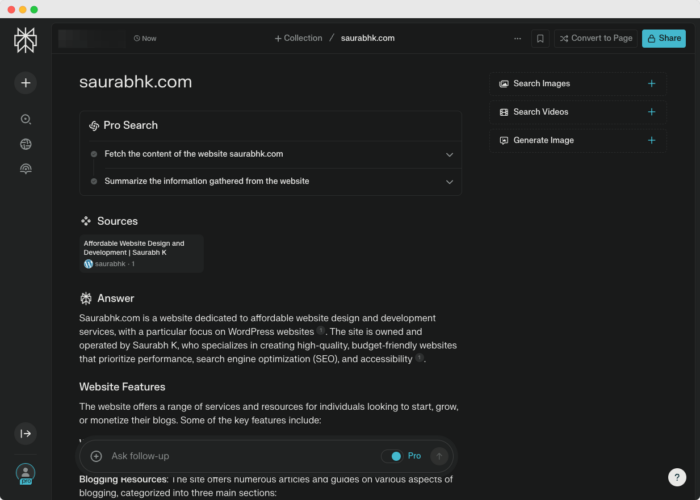
Perplexity AI is a search engine that provides direct answers using real-time internet data.
Key features of Perplexity AI
- AI-generated answers with citations
- Real-time information updates
- Free to use
- Mobile app available
Perplexity AI feels a lot like chatting with a smart friend who has instant access to the internet. It gives you answers, not just links.
One thing to keep in mind is that Perplexity AI’s answers can sometimes be too long. You might need to ask for shorter responses if you’re in a hurry.
If you want quick, up-to-date answers without having to click through multiple websites, Perplexity AI could be your new go-to tool.
24. Andi
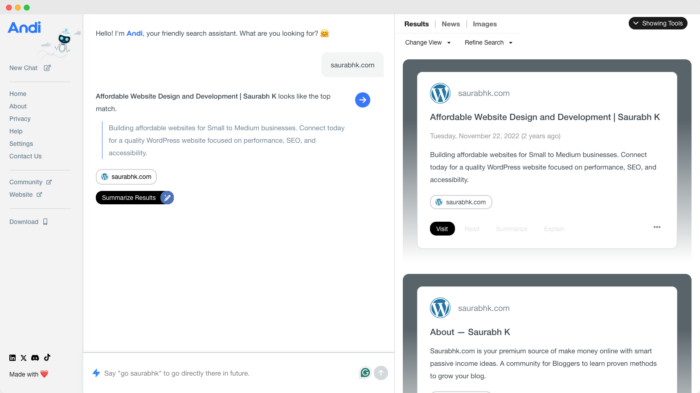
Andi is an AI-powered search engine that also focuses on giving direct answers.
Key features of Andi
- Ad-free search experience
- Privacy-focused design
- Conversational interface
- Sources cited with answers
Andi aims to make searching feel more like a natural conversation. You ask, and it answers — simple as that.
Remember that Andi is still growing. Its knowledge base might not be as vast as some bigger search engines yet.
For those who value privacy and hate ads, Andi is a breath of fresh air.
25. Komo
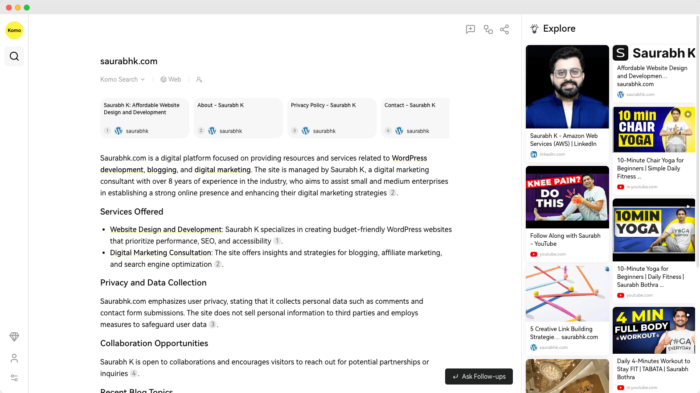
Komo is an AI-powered search engine transforming how we find and interact with information online. It focuses on delivering direct answers and insights rather than just a list of links.
Key features of Komo
- AI-driven search for quick, accurate results
- Chat function for in-depth discussions
- Explore mode to discover social media trends
- Ad-free experience for distraction-free searching
- Privacy focus to keep searches private
Komo searches websites, articles, and online discussions to provide a clear summary of the most helpful information. It offers three main modes: Chat, Explore and Search.
Komo is good for students and researchers seeking reliable information or writers and content creators looking for inspiration.
If you’re tired of ads in your search results and want a more tailored search experience, Komo might be just what you’re looking for.
26. Phind
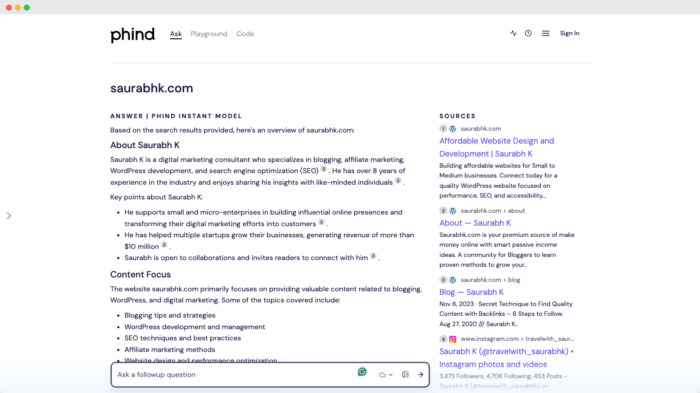
Phind is an AI search engine that specializes in technical and coding questions.
Key features of Phind
- Detailed answers to programming questions
- Code snippets in responses
- Up-to-date tech information
- Free to use
Phind is like having a coding expert at your fingertips. It doesn’t just find answers — it explains them in detail.
Remember that Phind is focused on tech and coding. It might not be as helpful for general questions or other topics.
For developers, programmers, and tech enthusiasts, Phind is a game-changer.
It’s particularly useful when you’re stuck on a coding problem or trying to understand a new technology.
27. Consensus
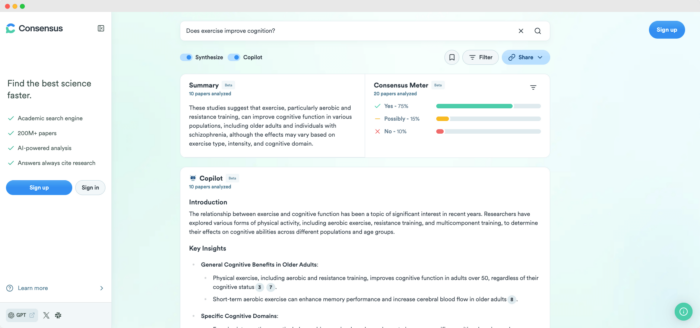
Consensus is an AI-powered search engine for scientific research.
Key features of Consensus
- Summarizes findings from multiple studies
- Focuses on peer-reviewed research
- Visualizes conflicting evidence
- Free for basic use
Consensus helps you navigate the world of scientific papers. It acts like a research assistant who can quickly summarize complex studies.
It is best for academic or scientific queries and not designed for everyday questions or general web searches.
For researchers, students, or anyone interested in evidence-based information, Consensus is a powerful tool.
28. Kagi
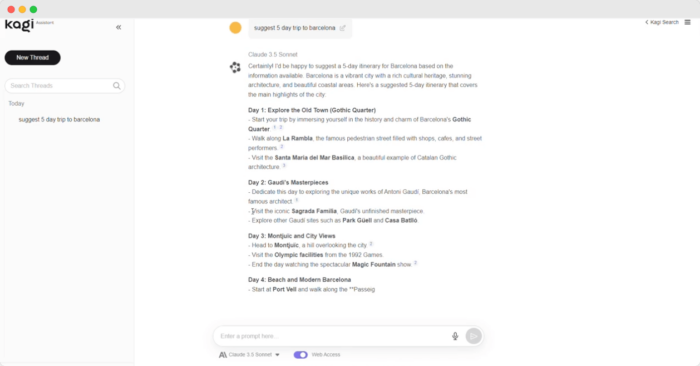
Kagi is a privacy-focused search engine with powerful customization options.
Key features of Kagi
- Ad-free search results
- Website ranking adjustments
- Customizable “Lenses” for specific searches
- Universal Summarizer tool
Kagi gives you control over your search experience. It lets you fine-tune to your exact preferences.
One thing to note is that Kagi is a paid service. While this ensures no ads and better privacy, it might not be for everyone.
If you’re willing to pay for a better search experience and value privacy, Kagi is worth considering.
These AI-powered search engines show how technology is changing the way we find and interact with information online.
They offer new ways to get answers and complete tasks, going beyond traditional search results pages.
Blockchain-Based Search Engines
These search engines use blockchain technology to give users more control over their data and searches.
29. Presearch
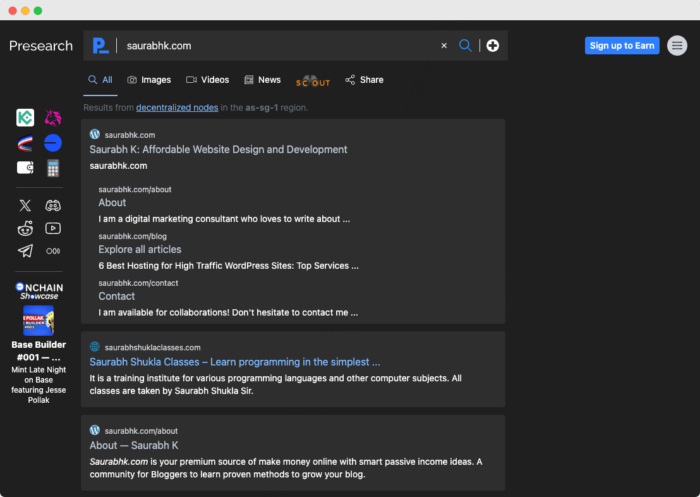
Presearch is a decentralized search engine that rewards users with cryptocurrency tokens for their searches.
Key features of Presearch
- Decentralized search nodes
- PRE token rewards for users
- Keyword staking for advertisers
- Privacy-focused approach
Presearch uses a network of community-operated nodes to process search queries. This setup aims to provide more privacy than traditional search engines.
When you use Presearch, you earn PRE tokens for your searches. These tokens can be used within the Presearch ecosystem or traded on some cryptocurrency exchanges.
For advertisers, Presearch offers a unique model. They can stake PRE tokens on keywords to have their ads show up for those searches. This system aims to create a fairer advertising marketplace.
If you’re interested in blockchain technology and want to earn something while you search, Presearch might be worth a try.
30. Almonit

Almonit is a search engine designed to help users find decentralized websites and applications.
Key features of Almonit
- Searches for .eth domains
- Focuses on decentralized web (Web3)
- No central server
- Open-source project
Almonit specializes in finding websites that use Ethereum Name Service (ENS) domains. These are websites that end in .eth instead of .com or .org.
When you use Almonit, you’re exploring a different part of the internet. It’s like having a guide to the decentralized web, where websites aren’t hosted on traditional servers.
Keep in mind that Almonit is for a specific type of content. You won’t find regular websites here, only those built on blockchain technology.
Almonit is an open-source project, which means anyone can contribute to its development. This approach fits with the decentralized ethos of the websites it helps you find.
It’s particularly interesting for developers and enthusiasts who want to see what’s possible with blockchain-based web technologies.
Academic and Research Search Engines
These search engines focus on specific types of information or user needs.
31. WolframAlpha

WolframAlpha is a computational knowledge engine. It gives direct answers to questions instead of just links to websites.
Key features of WolframAlpha
- Answers factual queries directly
- Performs calculations and data analysis
- Covers topics from math to nutrition
- Visualizes data with graphs and charts
WolframAlpha is great for getting quick, precise answers to factual questions.
It’s especially useful for students and researchers who need specific data or calculations.
Keep in mind that WolframAlpha isn’t meant for general web searches. It works best when you’re looking for facts, figures, or computations.
If you need exact answers or data analysis, WolframAlpha is a top choice. It’s your personal smart assistant for math, science, and other fact-based topics.
32. Google Scholar

Google Scholar is a search engine for academic papers, books, and other scholarly works.
Key features of Google Scholar
- Searches academic papers, theses, and books
- Citation tools
- Links to library resources
- Author profile pages
Google Scholar helps students and researchers find academic information quickly. It’s great for finding papers on specific topics or tracking citations.
Remember, Google Scholar doesn’t always give you full access to papers. You might need a university login or have to pay to read some articles.
If you’re doing research or writing a paper, Google Scholar is a top pick.
33. Semantic Scholar
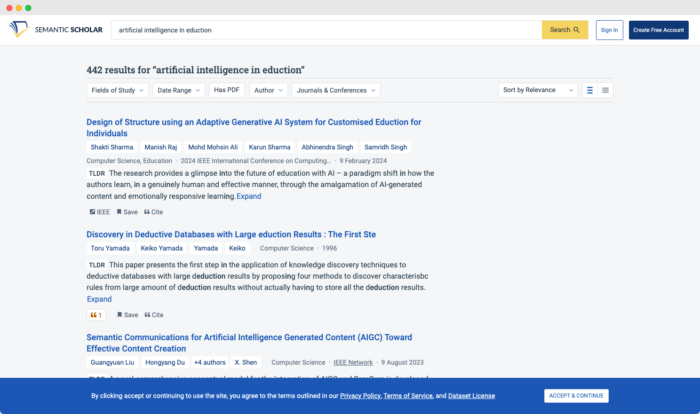
Semantic Scholar is a search engine for academic papers that uses AI to help you find relevant research quickly.
Key features of Semantic Scholar
- AI-powered search for academic papers
- Shows key findings from papers
- Tracks paper influence and connections
Semantic Scholar is great for researchers who want to cut through the noise and find important papers fast.
It focuses on certain fields, like computer science and medicine. It might not have as much for other subjects.
If you’re doing research and want to find important papers without spending hours searching.
Semantic Scholar is a great alternative to Google Scholar with AI capabilities.
Multimedia and Images Search Engine
34. TinEye
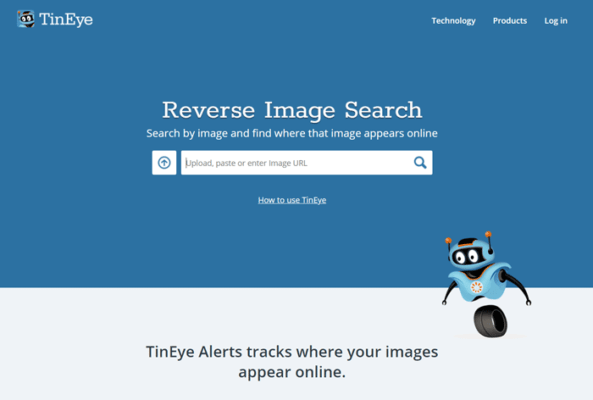
TinEye is a reverse image search engine. It helps you find where an image appears online.
Key features of TinEye
- Searches by image upload or URL
- Finds modified versions of images
- Sorts results by size, date, or similarity
- Browser extensions available
TinEye is excellent for tracking down the source of an image or finding higher-quality versions. It’s useful for photographers, designers, and researchers.
Keep in mind that TinEye only searches for images. It can’t do regular web searches or look for text.
If you need to find out where an image came from or how it’s being used online, TinEye is an excellent alternative to Google Image Search.
35. Pixabay

Pixabay is a search engine for free, high-quality stock images, videos, and music.
Key features of Pixabay
- Millions of royalty-free media files
- Easy-to-understand license terms
- No account is required for most downloads
- Community-contributed content
Pixabay makes it easy to find visuals for your projects without breaking the bank. It’s like having a professional photo studio at your fingertips.
While Pixabay’s content is free, always double-check the license terms for commercial use.
Other similar and popular image search engines include Unsplash, Shutterstock, Adobe Stock, FreeImages, and Pexels to mention but a few.
- 15+ Sites for Copyright Free Stock Photos and Royalty-Free Images
- 6 Proven Tips to Quickly Create Images for Blog or Website
For bloggers, designers, or anyone needing high-quality visuals on a budget, Pixabay is a go-to resource.
36. Flickr
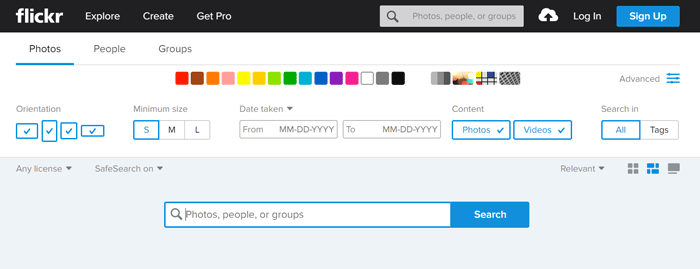
Flickr is a photo-sharing platform that doubles as a powerful image search engine.
Key features of Flickr
- Advanced search filters
- Creative Commons license search
- Groups and collections
Flickr’s search function lets you find photos and videos based on tags, titles, and descriptions.
You can also filter results by license type, making it easy to find images you can use for various purposes.
For high-quality photos on almost any subject, especially those available for reuse, Flickr is an excellent search tool.
Archives and Creative Commons Search
37. Internet Archive Search
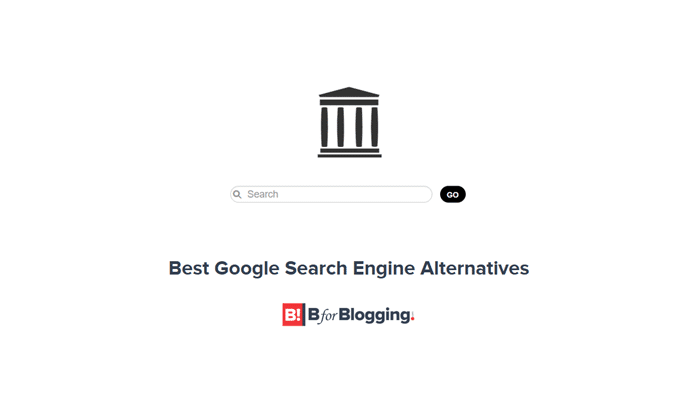
The Internet Archive Search aka WayBackMachine, lets you look through old versions of websites and digital content.
Key features Internet Archive Search
- Searches archived web pages
- Includes books, movies, and music
- Shows how websites looked in the past
This search tool is great for researchers, historians, or anyone curious about how the internet used to be. You can see how websites changed over time.
Remember, not all websites are archived, and some might be incomplete. It is also very slow compared to modern web searches.
It’s like a time machine for the internet.
38. CC Search – Creative Commons Search Portal
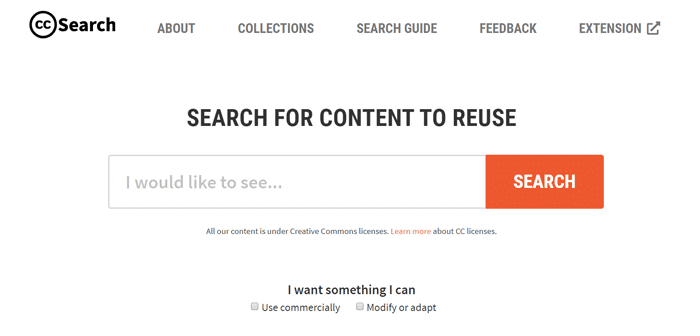
CC Search or Creative Commons Search Portal helps you find content you can freely use, share, or change.
Key features of Creative Commons Search Portal
- Searches for Creative Commons licensed works
- Includes images, music, and videos
- Filters by license type
CC Search is great for creators who need content they can legally use in their work. It’s like a treasure hunt for free-to-use media.
Remember, you still need to follow the rules of each license. Some might ask you to give credit to the creator.
If you’re making something and need images, music, or videos you can use without worry, CC Search is a top pick.
It’s perfect for bloggers, students, or anyone working on creative projects.
These specialized engines show how search can be tailored to specific needs, offering alternatives to general-purpose search engines for particular tasks.
As social media platforms evolve, they’re becoming powerful search tools in their own right.
Let’s look at some of the most popular platforms that double as search engines.
39. YouTube Search
YouTube is more than just a video-sharing site – it’s the world’s second-largest search engine after Google.
Key features of Youtube
- Vast library of video content
- Advanced search filters
- Personalized recommendations
- Closed captions and transcripts
YouTube’s search function helps users find specific videos, channels, and playlists. Its algorithm considers factors like watch time, engagement, and relevance to deliver results.
YouTube’s search is heavily influenced by your viewing history. This can be good for finding similar content but might limit your exposure to new topics.
It’s limited to video content, so it’s not suitable for all types of searches.
If you’re looking for visual information or how-to guides, YouTube is often the best place to start your search.
40. TikTok Search
TikTok has quickly become a go-to search engine for younger users, especially Gen Z.
Key features of TikTok
- Short-form video results
- Hashtag-based search
- Location-specific content
TikTok’s search function lets users find trending topics, specific creators, or niche interests. Its algorithm is particularly good at surfacing relevant, engaging content.
Remember that TikTok’s content is mostly user-generated. While this can lead to fresh, authentic information, it’s important to verify facts from authoritative sources.
For quick, visual answers or to tap into current trends, TikTok’s search can be incredibly useful.
41. Instagram Search
Instagram is a visual platform that’s become a powerful search tool for images and trends.
Key features of Instagram
- Image and video-based search
- Hashtag exploration
- Location-based content discovery
Instagram lets you find photos and videos related to your interests. It’s like having a big photo album of the world that you can flip through.
Remember that Instagram focuses on short videos, and visuals with short captions. You won’t find long articles or detailed explanations here.
If you’re looking for fashion ideas, travel inspiration, or want to see what’s trending, Instagram can be really useful.
42. Twitter Search

Twitter is a platform for short messages that’s become a real-time search engine for news and trends.
Key features of Twitter
- Real-time search results
- Advanced search operators
- Trending topics
- Ability to search by hashtags
Twitter lets you find what people are saying about topics right now. It’s like listening to millions of conversations at once and picking out the ones you care about.
Remember that Twitter limits posts to 280 characters. You’ll get quick updates, not long explanations.
It’s great for following breaking news, joining conversations, or seeing what people think about current events.
43. Facebook Search

Facebook’s search can help find people, businesses, and content shared on the platform.
Key features of Facebook Search
- Personalized results based on your activity
- Searches across posts, people, photos, and more
- Privacy-focused – doesn’t use off-Facebook searches
Facebook search results are influenced by your interactions on the platform, like pages you follow and friends you have.
Facebook search is also useful for finding local events, businesses, and public discussions on current topics.
Results are limited to content within Facebook, which may not be as broad as web-wide searches.
44. Pinterest

Pinterest is a visual search engine that helps users find ideas for projects and interests.
Key features of Pinterest
- Image-based search results
- Idea pins for step-by-step guides
- Visual search tool for finding similar images
- Categorized search results
Pinterest lets you search using pictures or words to find images related to your interests.
Keep in mind that Pinterest focuses on visuals. You won’t find long articles or detailed explanations here.
If you’re looking for inspiration for home decor, recipes, fashion, or DIY projects, Pinterest can be really helpful.
45. LinkedIn

LinkedIn is a professional network that’s become a powerful search tool for job-related content and business information.
Key features of LinkedIn
- People and company search
- Job listings search
- Content search for articles and posts
- Advanced filters for precise results
LinkedIn’s search helps find professional connections, job opportunities, and industry insights.
LinkedIn provides three different search engines each with its own specific filters and functions.
For example,
- If you are looking for people within LinkedIn, you need to use LinkedIn Advanced People Search engine.
- Additionally, if you are looking for open and closed job positions, you need to use the LinkedIn Advanced Job Search tool.
- In the same way, if you are looking for Answers within the network, you need to use LinkedIn Answers Advanced Search.
All these have their specific filters that let you pinpoint just what you want from the system.
It aims only for professional content. If you’re job hunting, looking to network, or want to learn about companies, LinkedIn can be really useful.
The free version has limited search capabilities compared to premium accounts.
It’s great for professional networking to grow careers or businesses.
Read More – 10 Best Social Media Management Tools for Productivity

Social Mention is a kind of search engine that scours social media platforms for mentions of brands, products, or topics.
- Real-time results from various social platforms
- Sentiment analysis (positive, negative, neutral)
- Top keywords and users related to your search
- Strength and reach metrics for mentions
Social Mention helps you keep tabs on what people are saying about your brand online.
Because it pulls data from many sources, so results can sometimes be overwhelming. It’s best used for specific, targeted searches.
47. Anoox

Anoox is a non-profit search engine and social network that aims to give users more control over search results.
Key features of Anoox
- User-curated search results
- Ad-free experience
- Built-in social networking features
- Focus on small businesses
Anoox lets users influence search results by voting and sharing content. It’s like a mix between a search engine and a social bookmarking site.
Remember, Anoox’s results might not be as comprehensive as larger search engines. Its strength lies in community-curated content.
If you’re tired of ad-filled search results and want to be part of a community-driven platform, Anoox offers a unique alternative.
These platforms show how different online spaces can act as search tools, each with unique strengths in finding specific types of content or connecting with particular communities.
User-Generated Content Based Search Engines
User-generated content (UGC) platforms have become powerful search engines in their own right. Let’s explore some of the most popular UGC-based search engines and how they function.
48. Reddit
Reddit is a massive online community where users share and discuss content on various topics.
Key features of Reddit
- Subreddit-specific searches
- Advanced search filters
- Upvote/downvote system for content ranking
Reddit’s search function lets you find posts, comments, and communities. You can search within specific subreddits or across the entire site.
The platform’s voting system helps surface the most relevant and popular content.
Reddit’s search works best with exact phrases or keywords. It might not catch misspellings or related terms as well as some other search engines.
If you’re looking for real people’s opinions or experiences on almost any topic, Reddit can be a goldmine of information.
49. Quora
Quora is a question-and-answer platform where users can ask questions and get answers from a community of experts and enthusiasts.
Key features of Quora
- Topic-based organization
- Upvoting system for answers
- Expert and verified user tags
Quora’s search function helps you find questions, answers, and topics. The platform organizes content by topics, making it easy to explore specific areas of interest.
Quora’s content quality can vary — while many answers come from experts, it’s always good to verify important information from other sources.
If you have specific questions or want to learn from others’ experiences, Quora can be a valuable resource.
50. Medium
Medium is a platform for long-form articles on various topics, written by both amateur and professional writers.
Key features fo Medium
- Tag-based search
- Curated collections
- Reading time estimates
Medium’s search function lets you find articles, publications, and tags. The platform uses a combination of algorithms and human curation to surface quality content.
Some Medium articles are behind a paywall and you will need a subscription to access all the content you find.
For in-depth articles on a wide range of subjects, from personal experiences to professional insights, Medium is a great place to search.
51. Tumblr
Tumblr is a microblogging platform that supports various types of content, including text, images, videos, and audio.
Key features of Tumblr
- Tag-based search
- Reblogging system
- Customizable blog themes
Tumblr’s search function helps you find posts, blogs, and tags.
The platform’s reblogging feature allows popular content to spread quickly, influencing search results.
Remember that Tumblr content can range from casual personal posts to more curated content.
If you’re looking for creative content, niche interests, or trending topics among younger users, Tumblr’s search can be very useful.
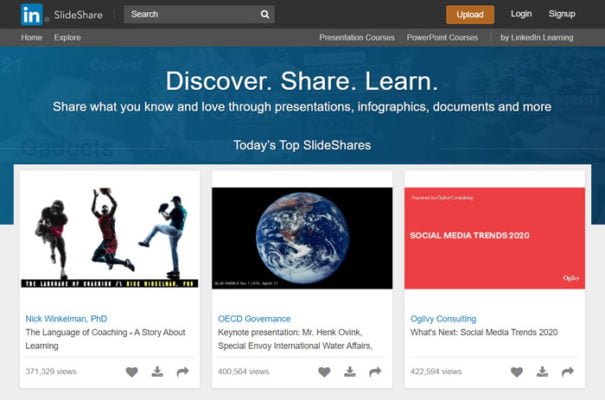
SlideShare is a platform for sharing presentations, infographics, and professional documents.
- Category-based browsing
- Keyword search
- Related content suggestions
SlideShare’s search function helps you find presentations, documents, and infographics on various topics. The platform organizes content into categories, making it easy to explore specific subjects.
SlideShare content is often created for professional or educational purposes.
If you’re looking for visual presentations on business, technology, or educational topics, SlideShare’s search can be incredibly useful.
53. BoardReader

BoardReader specializes in searching discussion forums and message boards across the web.
Key features of BoardReader
- Focused search for user-generated content
- Results from various forum platforms
- Option to sort by date
- Ability to find discussions on specific topics
BoardReader helps you tap into online conversations. BoardReader might not cover every forum out there, especially newer or less popular ones.
For marketers wanting to understand customer opinions or researchers looking for public discussions on niche topics, BoardReader is a goldmine.
Each of these platforms offers a unique approach to searching user-generated content. By understanding their strengths and limitations, you can choose the right tool for your specific information needs.
Niche Content Search Engines
These search engines focus on specific types of content or industries. They’re great for finding specialized information.
54. Scribd

Scribd is a digital library that lets you search for books, audiobooks, and documents.
Key features of Scribd
- Extensive library of written and audio content
- Subscription-based access to premium content
- Mobile apps for on-the-go reading and listening
- Personalized recommendations
Scribd is a paid service that helps you find written and audio content on almost any topic.
If you love reading or listening to books and want access to a huge collection, Scribd can be really useful.
55. Blog Search Engine
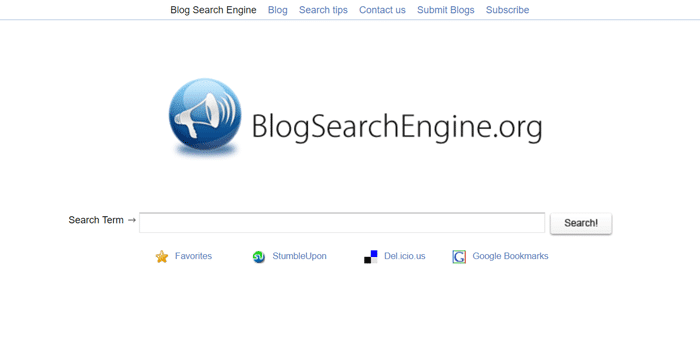
Blog search engines help you find specific blog posts on various topics you’re interested in.
Key features of Blog Search Engine
- Searches millions of blogs
- Filters for post-date and language
- Option to search within specific blog domains
- RSS feed subscriptions
If you want to read personal experiences, opinions, or niche information that might not show up in regular searches, blog search engines can be really helpful.
Remember that blog content can vary in quality. It’s smart to check the credibility of the blogs you find.
56. Crunchbase
Crunchbase is a search engine for business information. It’s great for finding details about companies and startups.
Key features of Crunchbase
- Detailed company profiles
- Funding and investment data
- Industry trends and insights
- API access for developers
Crunchbase helps you learn about businesses, their funding, and who’s running them.
Some of the best info on Crunchbase needs a paid account. The free version gives you basic details, but not everything.
If you’re looking into companies, startups, or business trends, Crunchbase is a top pick.
It’s perfect for investors, job seekers, or anyone curious about the business world.
57. BuiltWith
BuiltWith helps you find out what technologies websites use. It’s great for developers and marketers who want to know how sites are made.
Key features of BuiltWith
- Identifies web technologies and frameworks
- Tracks technology trends
- Provides market share data
- Offers Chrome extension for quick lookups
BuiltWith is like a detective for websites. It tells you what tools and systems a site uses behind the scenes.
It’s perfect for web developers, marketers, and tech-savvy business owners.
58. OpenMD
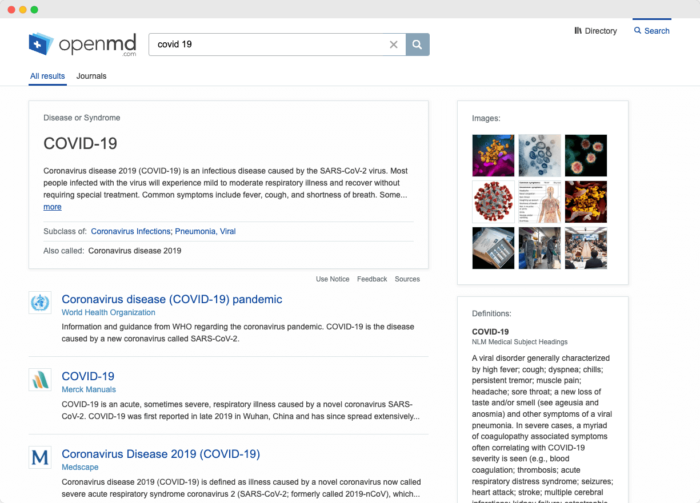
OpenMD is a search tool designed for health and medical information, scouring billions of trustworthy documents.
Key Features of OpenMD
- Searches medical journals, health organizations, and government databases
- Filters out commercial and user-generated content
- Prioritizes free and open-access sources
- Offers instant summary panels on medical topics
- Includes a curated directory of top health resources
OpenMD searches through scientific papers, health agency reports, and medical references to provide relevant, trustworthy information.
It focuses on quality by filtering out commercial content and prioritizing reputable sources.
OpenMD’s directory feature offers a curated selection of the best online medical references, making it easy to find trusted health resources.
Ideal for patients needing reliable health info, medical professionals seeking the latest research, students on health projects, and journalists fact-checking medical stories.
For accurate, up-to-date health information, OpenMD offers a focused alternative to general search engines, cutting through the noise to get to the heart of medical topics.
Specialized Search Engines for Web Developers
59. Siteliner
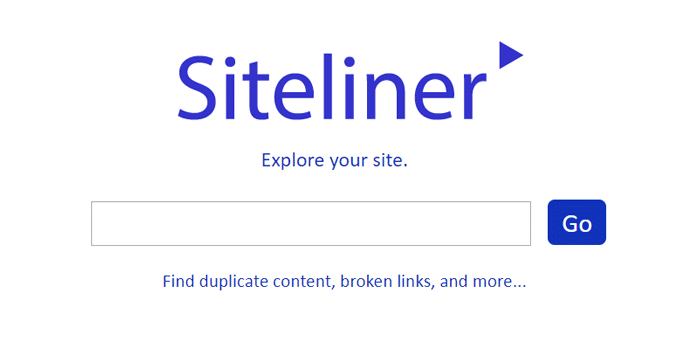
Siteliner is a free tool that scans your website for common issues. It’s like a quick health check for your site.
Key features of Siteliner
- Spots duplicate content
- Finds broken links
- Checks redirects
- Makes XML sitemaps
Siteliner crawls your site and gives you a clear picture of its structure. It’s great for finding hidden problems that might hurt your search rankings.
The duplicate content finder is especially handy. It shows you exactly where content overlaps, so you can fix it fast.
For SEO work, the XML sitemap creator is a real-time-saver. It helps search engines understand your site better.
Remember, the Siteliner is just one tool in your kit. Use it with other SEO tools for best results.
60. Developer Search Engines
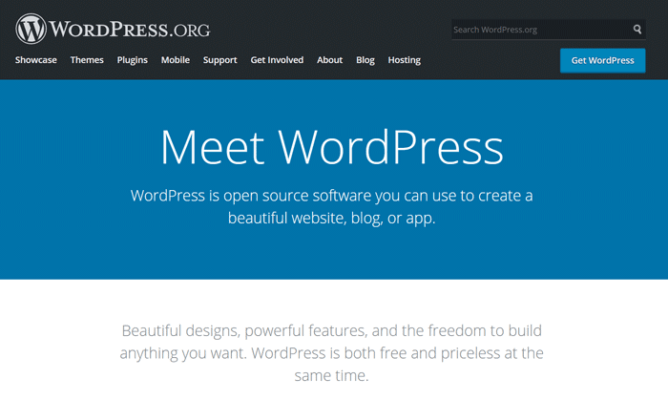
Many open-source platforms have their own search engines. These aren’t for everyday web searches – they’re made for finding code and developer tools.
Platforms like WordPress, Joomla, Drupal, npm, and Dev Community have search engines built in. They help you find themes, plugins, and modules quickly.
What makes them special
- They know developer’s language
- You can filter by coding language
- They search code repositories
- They often show user ratings
These search engines do more than find code, they help you make smart choices about the tools you use.
For example, the WordPress plugin directory lets you search by compatibility and how well a plugin is maintained.
If you’re into JavaScript, searching on npm can help you find the right package fast. You’ll see download stats and docs right away.
These tools save you time and help you build better websites and apps. Knowing how to use them can give you an edge in your work.
Metasearch Engines
Metasearch engines offer a unique way to find information online. Let’s dive into some popular options:
61. Searx
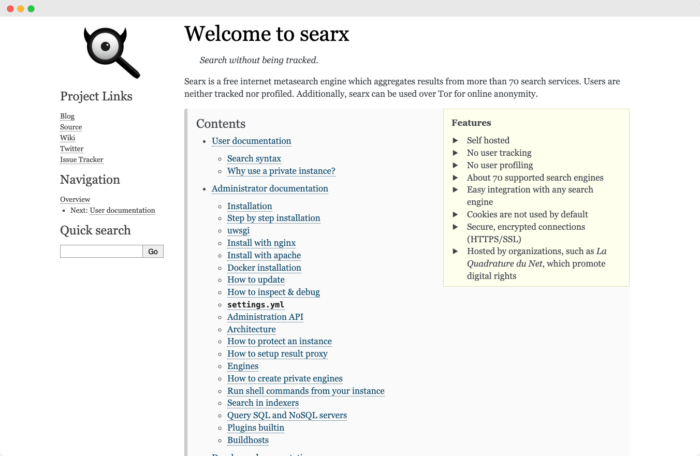
Searx is an open-source metasearch engine that puts privacy first. It is also a self-hosted search engine that combines results from more than 70 search services.
Key features of Searx
- Available as a self-hosted option
- Combines results from many search engines
- No user tracking or data collection
- Customizable search settings
Searx works like a privacy shield between you and big search engines. It grabs results from places like Google or Bing but doesn’t let them see who’s asking.
One cool thing about Searx is that you can run it on your own computer. This gives you total control over your searches. However, its maintenance has been stopped about an year ago.
It’s great for people who want good search results without feeling like they’re being watched.
62. InfoSpace
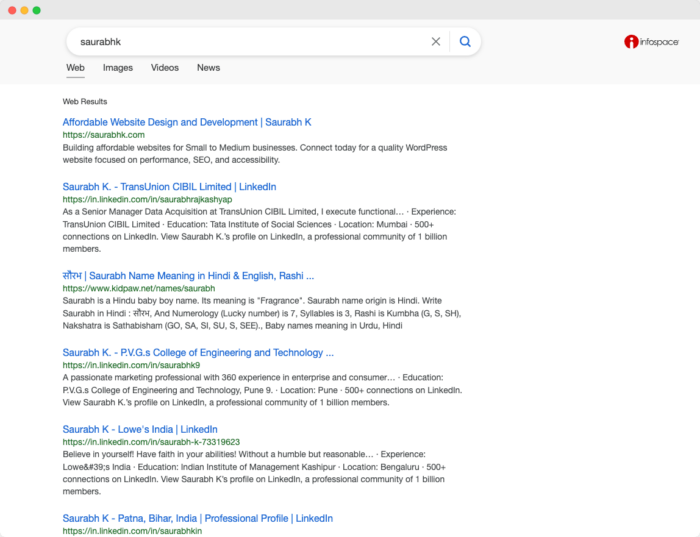
InfoSpace isn’t just a search engine, it powers other search engines as well.
Key features of InfoSpace
- Owns several search brands
- Provides white-label search solutions
- Offers mobile content services
InfoSpace is the wizard behind the curtain for some search engines you might know. It runs popular tools like Dogpile, MetaCrawler, and WebCrawler.
When you use an InfoSpace-powered search, you’re getting results from multiple sources. This can give you a wider view of what’s out there.
63. MetaCrawler

MetaCrawler was one of the first metasearch engines, changing how we look for info online.
Key features of MetaCrawler
- Combined results from major search engines
- Removed duplicate results
- Offered categorized search options
MetaCrawler is a part of Infospace Holdings, and its UI is identical to its other family members like WebCrawler and Infospace search engine.
MetaCrawler is like asking several experts at once and getting a summary of their answers in term of traditional search links. It helped users see a broader range of results quickly.
64. WebCrawler Search
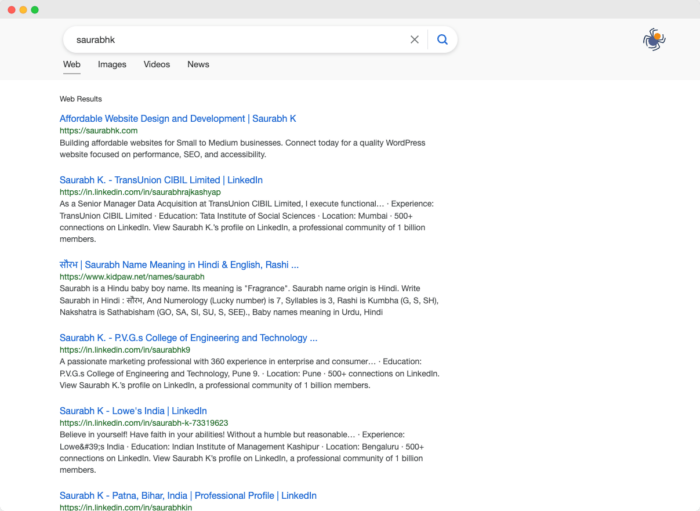
WebCrawler is one of the oldest search engines still around today.
Key features of WebCrawler
- Simple, clean interface
- Metasearch capabilities
- Long history dating back to 1994
WebCrawler was the first search engine to let users search for any word on any webpage. This might seem basic now, but it was a big deal back then.
Today, WebCrawler keeps things simple. It gives you a mix of results from different sources without fancy features that might slow you down.
For folks who like a straightforward search experience without bells and whistles, WebCrawler offers a blast from the past with modern results.
Each of these metasearch engines brings something unique to the table. Whether you’re after privacy, simplicity, or a broad range of results, there’s a tool here that might fit your needs.
Google Search Alternatives for Greater Good
These search alternatives to Google are known for adding social impact to the search experience.
65. YouCare

YouCare is a search engine that donates a portion of its ad revenue to charity.
Key features of YouCare
- Privacy-focused search
- Charitable donations from ad revenue
- User choice in charity selection
- Clean, ad-light interface
YouCare lets you do good just by searching the web. It’s like turning your everyday queries into mini-donations.
Remember that YouCare is newer and smaller than some major search engines, so results might not be as comprehensive.
For those who want their online activities to have a positive impact, YouCare offers a simple way to contribute to causes you care about.
66. Seva Search
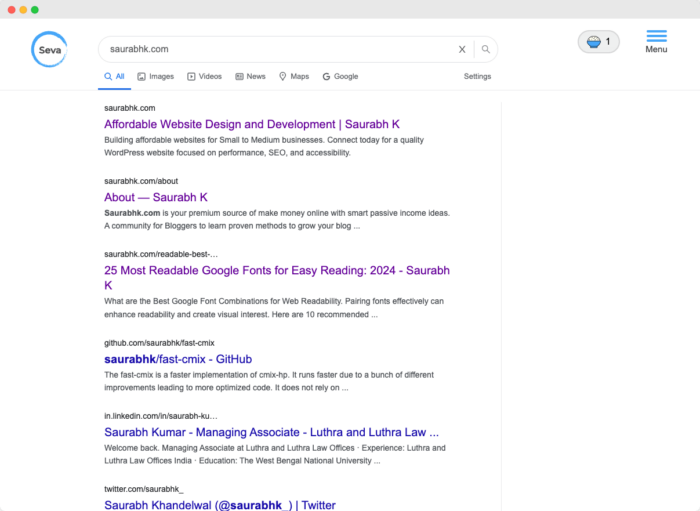
Seva Search is a search engine that turns your searches into donations for good causes.
Key features of Seva Search
- Donates over 50% of ad revenue to charities
- Users choose which cause to support
- Powered by major search engines
Seva Search works just like other search engines but with a twist.
When you search and click on ads, they give most of the money they earn to charities you pick.
It relies on you clicking ads to generate donations. The search results come from other big search engines, so the experience is familiar.
It’s perfect for people who want to support good causes without spending extra money or changing their online habits.
67. Ecosia
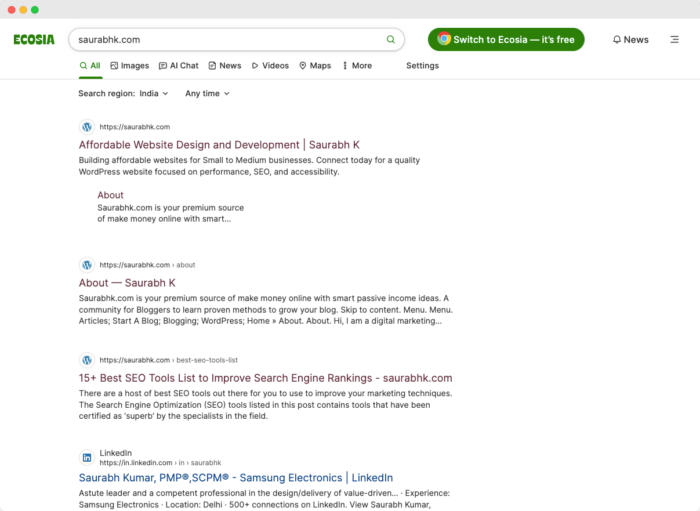
Ecosia is a search engine that plants trees around the world with its profits, appealing to environmentally conscious users.
Key features of Ecosia
- Plants trees with search profits
- Runs on renewable energy
- Privacy-friendly policies
- Tree counter in the interface
Ecosia lets you do something good for the planet just by searching online. It’s like turning your everyday web searches into a way to help the environment.
Keep in mind that Ecosia uses Bing for its search results. This means you might not see much difference in the actual search results compared to Bing.
If you want your online searches to have a positive impact on the world, Ecosia is a great choice.
68. Goodsearch
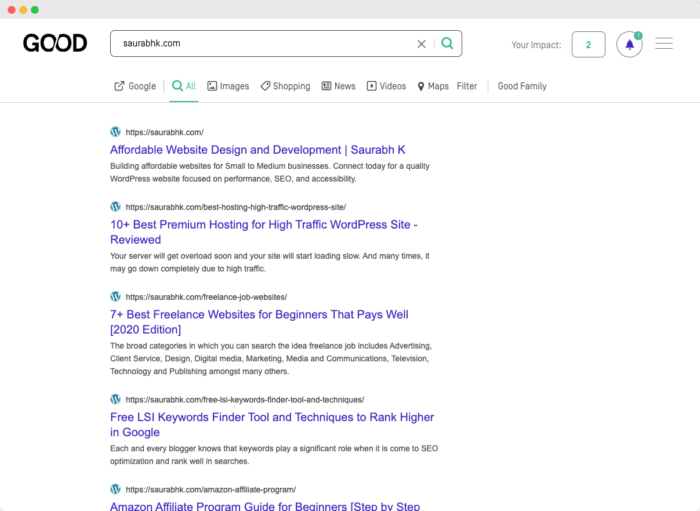
Goodsearch is a search engine that donates to charities when you use it. It’s for people who want to help good causes while searching online.
Key features of Goodsearch
- Donates to user-selected charities
- Coupon and deal finder
- Powered by Yahoo’s search technology
- Tracks donations for users
Goodsearch turns your everyday searches into a way to support causes you care about. It’s like doing good just by looking things up online.
As it uses Yahoo’s search technology, results may not be as comprehensive as those from larger search engines.
These eco-friendly options show how search engines can go beyond just finding information to make a positive impact on the world.
They offer users a way to align their online habits with their values.
Other Alternatives
These search engines offer unique approaches to finding information online.
69. Wiki.com

While not a search engine itself, wikis are important for online information sharing. Wiki.com focuses on searching wikis and collaborative knowledge bases.
Key features of Wiki
- Searches across multiple wiki platforms
- Topic-based browsing
- User-editable content
- Collaborative knowledge building
- Often used for encyclopedias or documentation
The most famous wiki is Wikipedia, but many other wikis exist for specific topics. It’s like a big, online book that anyone can help write and edit.
Wiki.com is great for finding in-depth, collaboratively created content on specific topics.
Wikis often show up in search results from other engines, providing in-depth information on many topics.
However, the quality of information can vary, and it’s not suitable for all types of searches.
70. Whois Domain Lookup

Whois Domain Lookup tools help you find information about domain names and their owners.
Key features of Whois Domain Lookup
- Domain registration details
- Registrar information
- Creation and expiration dates
- Name server data
These tools let you peek behind the curtain of any website. You will find limited information if the domain uses privacy protection services.
For businesses, researchers, or anyone curious about website ownership, Whois Domain Lookup tools are invaluable resources.
Conclusion
Google isn’t the only game in town when it comes to online searches. From tools that protect your privacy to those that help you find specific types of content, there’s a search engine for almost every need.
If you’re worried about your online privacy, you might like DuckDuckGo or Startpage.
For school or research projects, Google Scholar or Semantic Scholar could be your go-to option.
If you’re more of a visual person, Pinterest or TinEye might work better for you.
Different parts of the world have their own popular search engines. Baidu is big in China, Yandex in Russia, and Naver in South Korea. These search engines know their local markets well.
Some search engines even try to make the world a bit better. Ecosia, for example, plants trees with the money it makes from searches.
New types of search engines are popping up all the time. You.com and Perplexity AI use artificial intelligence to give you different kinds of search results.
Presearch uses blockchain technology to reward people for using their search engine.
The best search engine for you depends on what you need. You might even use different search engines for different tasks. Try out a few and see which ones you like best.
Remember, a good search engine should help you find what you’re looking for quickly and easily. Don’t be afraid to experiment with different options to find what works best for you.
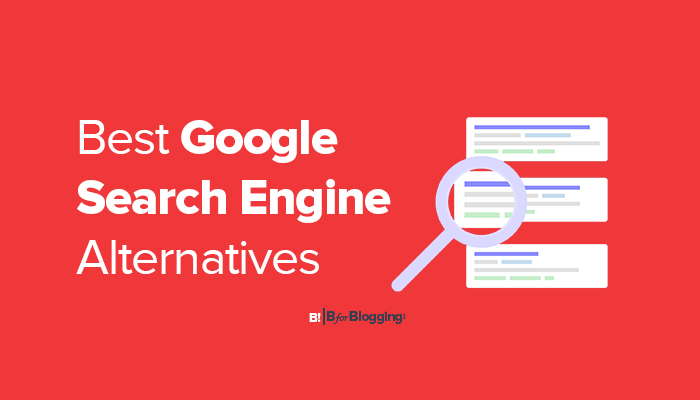

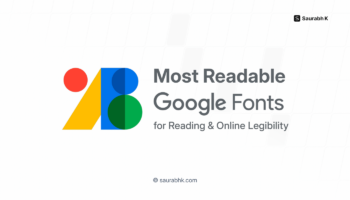


These days google search is too crowded with too many website’s already, and it’s seems a good idea to not only focus on google to attract more traffic. Very helpful! Good Job!
I think Gibiru is kind of outdated and clunky. There are quite a few other options out there that provide some unique and up-to-date search results and features.
Qwant, Search Encrypt and Searx come to mind for me.
Consider also adding Petey Vid, a privacy-focused Video search engine for mainly non-YouTube content. -It’s also multi-lingual.
Give SearchScene.com a go! It’s a charitable search engine that donates 95% of its profits to charity. Great search results too – much like Google. Unlike Google, it doesn’t bombard you with ads and track you across the internet!